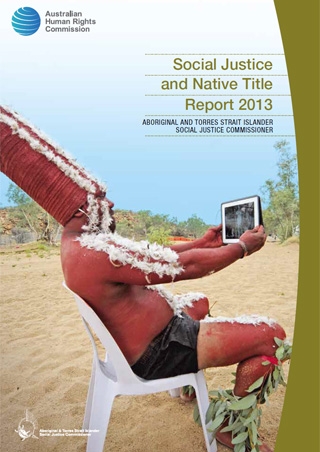Social Justice and Native Title Report 2013
Archived
You are in an archived section of the website. This information may not be current.
This page was first created in December, 2013

Transmittal Letter
5 November 2013
Senator the Hon George Brandis QC
Attorney-General
PO Box 6100
Senate
Parliament House
CANBERRA ACT 2600
Dear Attorney
Social Justice and Native Title Report 2013
I am pleased to present to you the Social Justice and Native Title Report 2013 (the Report), which I have prepared in accordance with section 46C(1)(a) of the Australian Human Rights Commission Act 1986 (Cth) and section 209 of the Native Title Act 1993 (Cth).
The Report examines the enjoyment and exercise of human rights by Aboriginal and Torres Strait Islander peoples from 1 July 2012 to 30 June 2013.
This year marks 20 years since the establishment of the Aboriginal and Torres Strait Islander Social Justice Commissioner role. To highlight this significant anniversary, chapters 1 and 2 of the Report reflect on the contributions of Social Justice Commissioners in key areas of social justice and native title over this period.
Building on the lessons from the past 20 years, I set out my priorities for Aboriginal and Torres Strait Islander affairs in chapter 3, focusing on the directions I believe we need to take to ensure our communities are in control of their future. This chapter shows how the realisation of human rights can produce long term sustainable improvements in the life outcomes for Aboriginal and Torres Strait Islander peoples.
At the start of my term as Social Justice Commissioner in 2010, I stated that one of my overarching priorities is to give full effect to the United Nations Declaration on the Rights of Indigenous Peoples (the Declaration).
Progress toward the achievement of this priority is addressed in this Report. For instance, chapter 4 outlines how our rights in the Declaration can be practically utilised in the development of alcohol management and related policies. The chapter then profiles case studies in the Northern Territory and Queensland to demonstrate how strategies that are consistent with the Declaration can provide opportunities to improve practice and outcomes in this complex policy area.
In chapter 5, I describe the significant role of business to respect and support the human rights of Aboriginal and Torres Strait Islander peoples articulated in the Declaration. The chapter also presents case studies that illustrate the positive outcomes that occur when business engages with Aboriginal and Torres Strait Islander peoples in a way that is consistent with our human rights in the Declaration.
The Report provides 14 recommendations for your consideration.
I look forward to discussing the Report with you.
Yours sincerely
Mick Gooda
Aboriginal and Torres Strait Islander
Social Justice Commissioner



